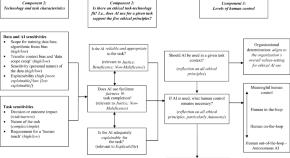A Capability Approach to worker dignity under Algorithmic Management
Authors (first, second and last of 4)

Collection
The use of artificial intelligence (AI) algorithms in human resources (HR) allows for hundreds or thousands of job applications to be sifted and evaluated at the touch of a button. Vendors and proponents of these systems often claim that they are free of individual prejudice, systematic bias, and are even better at discerning the virtues and vices of applicants. However, these bold claims have come under increasing ethical scrutiny. On the one hand, the ethical challenges raised by AI in the HR domain are similar to those that have received significant attention in other societal domains, such as policing and criminal justice, especially surrounding the problem of discriminatory profiling reinforcing historical discrimination. Similarly, challenges to explainability, privacy, and accountability are prominent as well. On the other hand, an emerging issue in the HR context that has been less investigated thus far is the impact of these algorithms on job seekers’ and employees’ autonomy to choose and control how they communicate their skills, motivation, personality, and experiences, while being subjected to reductionist and opaque quantification of these highly nuanced, contextual, and dynamic qualities. This topical collection invites diverse perspectives on these and other dimensions of the ethics of AI in HR.
Matthew J. Dennis is an ethicist of emerging technology. His research focuses on digital well-being and how to design online technologies for human flourishing. He is currently a Research Fellow in Ethics of Socially Disruptive Technologies (Philosophy & Ethics, TU/e). Prior to this he was a Marie Skłodowska-Curie Research Fellow (Values, Technology & Innovation, TU Delft, 2019–2021) and an Early-Career Innovation Fellow (Institute of Advanced Studies, 2018–2019).
Evgeni Aizenberg is a post-doctoral researcher at TU Delft’s AiTech multi-faculty program, where he is leading the project Designing for Human Rights in AI. In his work, Evgeni aims to bridge socio-technical gaps in development of AI through a trans-disciplinary design process grounded in values embodied by human rights, empirical study of context, and direct involvement of societal stakeholders.

